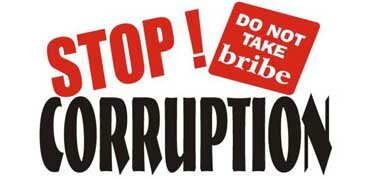ANTI-CORRUPTION

“Corruption represents a threat …to the stability and security of societies, undermining the institutions of democracy, ethical values and justice and jeopardizing sustainable development and the rule of law”. – Preamble to the UN Convention on Corruption
Corruption is a major problem for West African states, where, in some cases, it has reached levels of gross and egregious theft. Corruption contributes to the impoverishment of the region as a whole and to the alienation of its people from their rulers. The existence of widespread corruption - especially in societies beset by mass poverty and very high levels of unemployment - has a deeply corrosive effect on trust in government and contributes to crime and political disorder.
Because of the negative impacts of corruption FECCIWA is intensifying its efforts to condemn corruption in West Africa.
About our campaign
Our campaign is based on educating citizens and church members on the evils of corruption and on building islands of integrity and transparency, thereby contributing towards the potential for sustainable peace and prosperity in West Africa.
Role of the churches
The churches of West Africa fully understand that corruption violates political and civil rights by rendering political institutions and processes ineffective. The churches are aware that corruption weakens the judiciary and law enforcement agencies and perverts the media.
Corruption infringes on economic and social rights by denying equitable access to public services such as health and education and creating obstacles to earning a livelihood.
Why churches in West Africa are fighting back against corruption
West African church leaders denounce corruption, because the poor must bear the costs of the greed and mismanagement by financial professionals. The West African church strongly feels that the fight against corruption is central and must remain at the top of the church’s agenda.
Churches play a crucial role in preventing corruption because they are contributing to the moral consciousness of citizens - especially with the fundamental principles of the church’s social doctrine: the dignity of the individual, the common good, and solidarity for the poor.
The greatest victims of corruption are the most vulnerable groups in society – the poor, women and children, the sick and the old. The churches will fight corruption on the regional level, and parishioners must continuously demonstrate their commitment to fight corruption at the local level.
About our campaign - Against all odds
National Christian councils and churches are to institutionalize “Zero Tolerance on Corruption” and foster moral integrity in churches, church schools, teacher-training colleges and seminaries. Furthermore, they will monitor governments’ compliance with anti-corruption conventions and begin to take concrete action and speak out to the public about the evils of corruption.
Our campaign makes clear that church leaders have standards they must adhere to and that churches will act as role models for ethical action in society at large.
Corruption-free schools
One important step is to fight corruption in schools. In 2003 FECCIWA already started a campaign in Liberia, Ghana, Togo, Cote d’Ivoire, Benin and Nigeria: “Build corruption-free schools and have a happy nation”. In all of these countries the campaign has proved successful.
Now the campaign is continuing with: “No sex for grades in schools, but by merits only”.
Our achievements
Due to our ongoing efforts to establish corruption-free schools we have succeeded in:
- Providing a Code of Conduct for the purpose to secure formal commitment from teachers, parents and students.
- Increasing involvement of school authorities, teachers, parents and students in the campaign
- Increasing awareness on corruption in institutions
- Distributing our widely used handbook on strategies to fight corruption.
Our thanks
We would like to thank our partners for supporting our work. The money provided by our donors is carefully used to implement programs for fighting corruption. We are grateful for your help and hope you will continue to provide assistance so that we can continue our activities.
We particularly acknowledge the support of:
- Bread for All, Geneva, Switzerland
- DM - Department Mission, Lausanne, Switzerland
- Church Development Service (EED), Bonn, Germany

